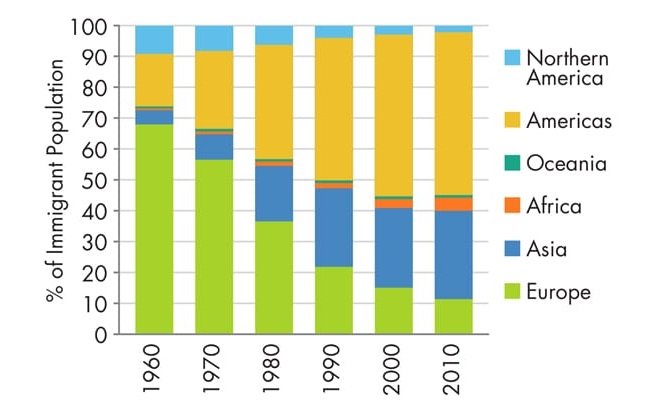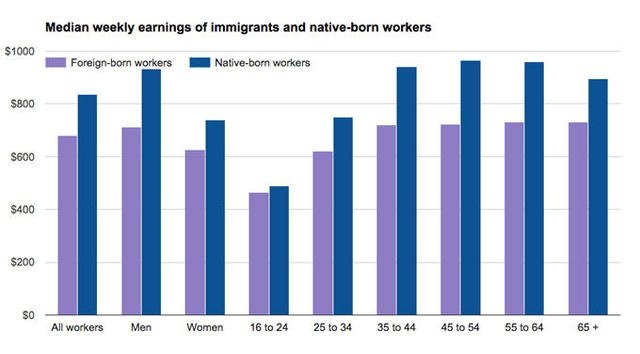The impact of immigration on American society is a complex and multifaceted issue that has been the subject of significant debate and study. Some of the key ways in which immigration has impacted American society include:

Demographic Changes
Immigration has played a significant role in shaping the demographics of the United States. For example, the foreign-born population in the United States has increased from 5 percent in 1965 to 13.7 percent in 2018. This has led to a more diverse and multicultural society, with people from a wide range of racial, ethnic, and cultural backgrounds living and working together in the United States.
See also: Studying Differences between Urban & Rural Populations in the United States

Economic Impacts
Immigration has had both positive and negative impacts on the U.S. economy. Some research suggests that immigration has contributed to economic growth and innovation, as well as to the expansion of certain industries. However, it has also been linked to wage stagnation and job competition for certain groups of workers.

Social & Cultural Impacts
Immigration has contributed to the cultural richness and diversity of the United States, with immigrants bringing their own customs, traditions, and cultural practices to American society. At the same time, immigration can also lead to tension and conflict between different groups, as they may struggle to adapt to new cultural norms and values.
See also: Exploring the Sites of America’s Civil War History

Education
Immigration has had an impact on the education system in the United States. Some research suggests that immigrant children have lower educational outcomes compared to native-born children, although this may be due to factors such as poverty and language barriers rather than immigration status itself. Other research suggests that immigrant students may actually have higher educational outcomes, particularly if they come from countries with strong education systems.

Healthcare
Immigration has also had an impact on the healthcare system in the United States. Some research suggests that immigrant populations may have lower rates of healthcare access and utilization compared to native-born populations, although this may be due to factors such as poverty and lack of insurance rather than immigration status itself. At the same time, immigrant populations may also contribute to the healthcare workforce, particularly in certain occupations such as nursing.

Crime
There is a common perception that immigrants, particularly unauthorized immigrants, have higher rates of criminal activity compared to native-born individuals. However, research suggests that this is not the case. In fact, some studies have found that immigrant populations have lower rates of criminal activity compared to native-born populations.
See also: Exploring the Most Notorious UFO Hotspots in the US

Political Participation
Immigration has also had an impact on political participation in the United States. Some research suggests that immigrant populations may be less likely to participate in the political process compared to native-born populations, although this may be due to factors such as lack of citizenship or difficulty with the English language rather than immigration status itself. At the same time, immigrant populations may also bring new perspectives and voices to the political process, particularly if they are able to naturalize and become citizens.

Employment
Immigration has had an impact on the labor market in the United States. Some research suggests that immigration can lead to wage stagnation or job competition for certain groups of native-born workers, particularly those with lower levels of education. At the same time, immigration can also contribute to the expansion of certain industries, particularly those that rely on low-skilled labor.
Public Attitudes
The public’s attitudes toward immigration can also have an impact on American society. In recent years, there has been significant debate and polarization around immigration issues, with some advocating for more restrictive policies and others advocating for more open and welcoming policies. This can lead to tension and conflict within society, as well as challenges in achieving consensus on immigration policy.
Overall, the impact of immigration on American society is complex and multifaceted, and it is difficult to make generalizations about the overall effects of immigration. Some research suggests that the overall impact of immigration has been positive, while other research suggests that there have been negative consequences as well.
